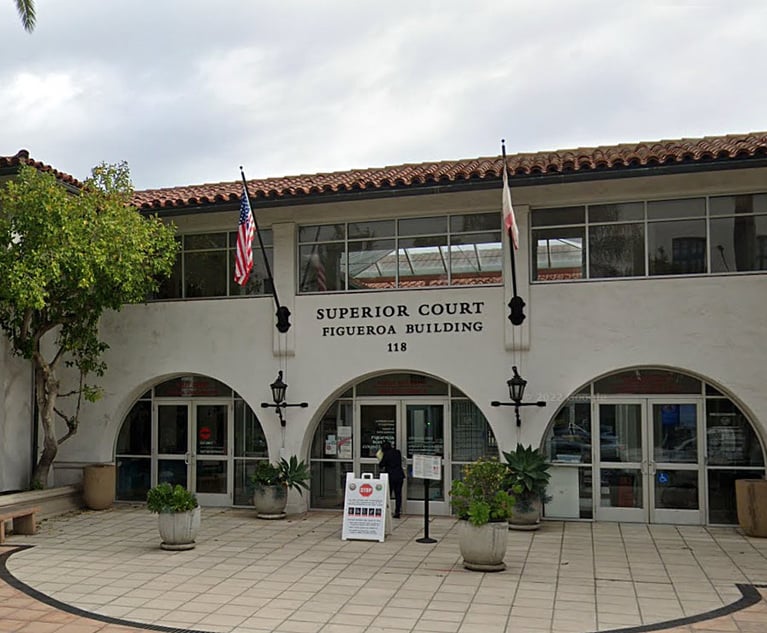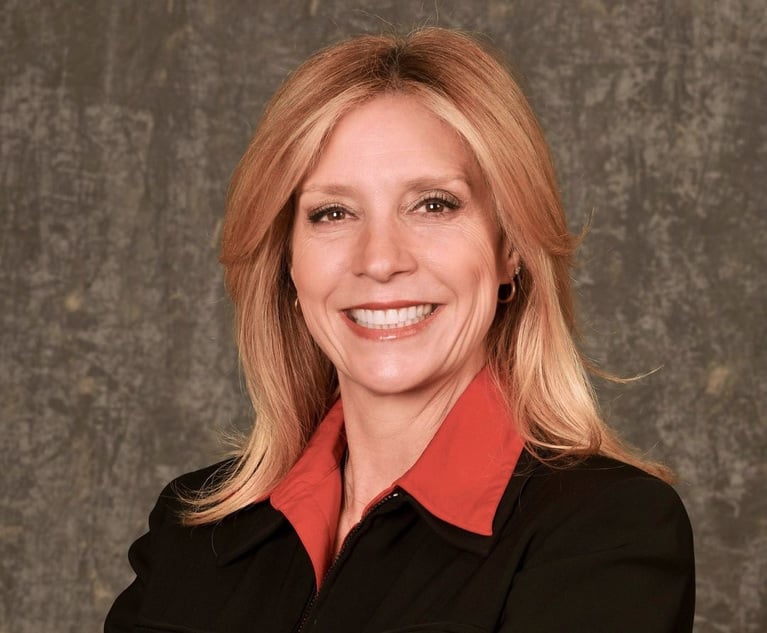 Chief Justice of California Tani Cantil-Sakauye, left, and First District Court of Appeal Presiding Justice J. Anthony Kline. (Photo: Jason Doiy/ALM)
Chief Justice of California Tani Cantil-Sakauye, left, and First District Court of Appeal Presiding Justice J. Anthony Kline. (Photo: Jason Doiy/ALM)Cantil-Sakauye Extols Courts as 'Place for Social Justice'
The California chief justice's annual annual State of the Judiciary address touched on a variety of topics, including immigration and the COVID-19 outbreak. Leaders in all three branches, she said, will "take all necessary action to protect our residents."
March 10, 2020 at 05:37 PM
4 minute read
Chief Justice Tani Cantil-Sakauye told state lawmakers Tuesday that court leaders want to be a "better partner" in addressing the state's homelessness crisis, a top issue among Californians and capital politicians.
In her annual State of the Judiciary address to a joint session of the Legislature, Cantil-Sakauye said she will appoint a working group to investigate whether surplus court properties can be repurposed as housing. The appointees—not yet named—will also consider whether specialty court programs aimed at helping the homeless should be reorganized and whether temporary assigned judges can help local courts with cases related to homelessness.
"Because we three branches work together, our courts have become more than a place to resolve disputes," Cantil-Sakauye said in prepared remarks released shortly before her address. "They have also become a place for social justice."
The initiative is not a surprise. In an appearance at the Public Policy Institute of California in December, the chief justice told a Sacramento audience that she was pondering ways the judicial branch could help ease the homelessness problem, including potentially opening up courthouses at night as shelters. Cantil-Sakauye did not advance that specific idea on Tuesday.
The U.S. Supreme Court just weeks ago turned down a chance to address how cities are confronting the nationwide plight of homelessness. Several California cities filed friend-of-the-court briefs backing the petitioner, Boise, Idaho, represented by lawyers from Gibson, Dunn & Crutcher. The firm Jones Day filed a brief on behalf of seven cities in Orange County, and the Los Angeles city attorney submitted a brief as well.
In a relatively brief speech that ran about 15 minutes, Cantil-Sakauye made only brief mention of the other issue roiling state politics, the COVID-19 outbreak. Court leaders around the state have been grappling with how to maintain operations while reported cases rise and at least one county has banned large-scale gatherings.
"We know we can rely on our California leaders in all three branches to keep our heads during the coronavirus epidemic to take all necessary action to protect our residents," she said.
On Tuesday, the superior court in Placer County, home of the first COVID-19 fatality in California, announced it has expanded the types of hearings where parties can appear by telephone. The court also reduced the number of appointments and workshops available to unrepresented litigants.
Two of the state's six appellate courts have also posted notices encouraging anyone concerned about health issues to consider arranging for oral arguments by teleconference.
The state Supreme Court has said in a statement that it is monitoring information about the virus and will continue normal operations.
In her speech, the chief justice touched on her past criticism of federal immigration "interference" at state courthouses. She did not, however, mention U.S. Immigration and Customs Enforcement arrests in and around state courthouses in Sonoma, San Francisco and Fresno counties.
Cantil-Sakauye turned instead to court programs, such as a human traffic prevention court, funded by the Legislature through so-called innovation grants, and work on alternatives to the state's cash-bail system.
The chief justice also highlighted state leaders' recent apology to Japanese Americans for helping the U.S. government send them to internment camps during World War II and noted that her husband's parents had been detained. She also praised Associate Justice Ming Chin, who announced in January that he will retire this summer.
"I dwell on Ming's life because he personifies the integrity and intellect of our nearly 2,000 judicial officers and approximately 20,000 court employees," she said. "Justice Chin is a jurist without parallel."
This content has been archived. It is available through our partners, LexisNexis® and Bloomberg Law.
To view this content, please continue to their sites.
Not a Lexis Subscriber?
Subscribe Now
Not a Bloomberg Law Subscriber?
Subscribe Now
NOT FOR REPRINT
© 2025 ALM Global, LLC, All Rights Reserved. Request academic re-use from www.copyright.com. All other uses, submit a request to [email protected]. For more information visit Asset & Logo Licensing.
You Might Like
View All


Santa Barbara Judge Accused of Moonlighting as Attorney for Secretary/Girlfriend
4 minute readLaw Firms Mentioned
Trending Stories
- 1The Fearless Forecaster’s Employment Law Predictions for 2025
- 2Judicial Conference Declines Democratic Request to Refer Justice Thomas to DOJ
- 3People in the News—Jan. 2, 2025—Eastburn and Gray, Klehr Harrison
- 4Deal Watch: Latham, Paul Weiss, Debevoise Land on Year-End Big Deals. Plus, Mixed Messages for 2025 M&A
- 5Bathroom Recording Leads to Lawyer's Disbarment: Disciplinary Roundup
Who Got The Work
Michael G. Bongiorno, Andrew Scott Dulberg and Elizabeth E. Driscoll from Wilmer Cutler Pickering Hale and Dorr have stepped in to represent Symbotic Inc., an A.I.-enabled technology platform that focuses on increasing supply chain efficiency, and other defendants in a pending shareholder derivative lawsuit. The case, filed Oct. 2 in Massachusetts District Court by the Brown Law Firm on behalf of Stephen Austen, accuses certain officers and directors of misleading investors in regard to Symbotic's potential for margin growth by failing to disclose that the company was not equipped to timely deploy its systems or manage expenses through project delays. The case, assigned to U.S. District Judge Nathaniel M. Gorton, is 1:24-cv-12522, Austen v. Cohen et al.
Who Got The Work
Edmund Polubinski and Marie Killmond of Davis Polk & Wardwell have entered appearances for data platform software development company MongoDB and other defendants in a pending shareholder derivative lawsuit. The action, filed Oct. 7 in New York Southern District Court by the Brown Law Firm, accuses the company's directors and/or officers of falsely expressing confidence in the company’s restructuring of its sales incentive plan and downplaying the severity of decreases in its upfront commitments. The case is 1:24-cv-07594, Roy v. Ittycheria et al.
Who Got The Work
Amy O. Bruchs and Kurt F. Ellison of Michael Best & Friedrich have entered appearances for Epic Systems Corp. in a pending employment discrimination lawsuit. The suit was filed Sept. 7 in Wisconsin Western District Court by Levine Eisberner LLC and Siri & Glimstad on behalf of a project manager who claims that he was wrongfully terminated after applying for a religious exemption to the defendant's COVID-19 vaccine mandate. The case, assigned to U.S. Magistrate Judge Anita Marie Boor, is 3:24-cv-00630, Secker, Nathan v. Epic Systems Corporation.
Who Got The Work
David X. Sullivan, Thomas J. Finn and Gregory A. Hall from McCarter & English have entered appearances for Sunrun Installation Services in a pending civil rights lawsuit. The complaint was filed Sept. 4 in Connecticut District Court by attorney Robert M. Berke on behalf of former employee George Edward Steins, who was arrested and charged with employing an unregistered home improvement salesperson. The complaint alleges that had Sunrun informed the Connecticut Department of Consumer Protection that the plaintiff's employment had ended in 2017 and that he no longer held Sunrun's home improvement contractor license, he would not have been hit with charges, which were dismissed in May 2024. The case, assigned to U.S. District Judge Jeffrey A. Meyer, is 3:24-cv-01423, Steins v. Sunrun, Inc. et al.
Who Got The Work
Greenberg Traurig shareholder Joshua L. Raskin has entered an appearance for boohoo.com UK Ltd. in a pending patent infringement lawsuit. The suit, filed Sept. 3 in Texas Eastern District Court by Rozier Hardt McDonough on behalf of Alto Dynamics, asserts five patents related to an online shopping platform. The case, assigned to U.S. District Judge Rodney Gilstrap, is 2:24-cv-00719, Alto Dynamics, LLC v. boohoo.com UK Limited.
Featured Firms
Law Offices of Gary Martin Hays & Associates, P.C.
(470) 294-1674
Law Offices of Mark E. Salomone
(857) 444-6468
Smith & Hassler
(713) 739-1250







